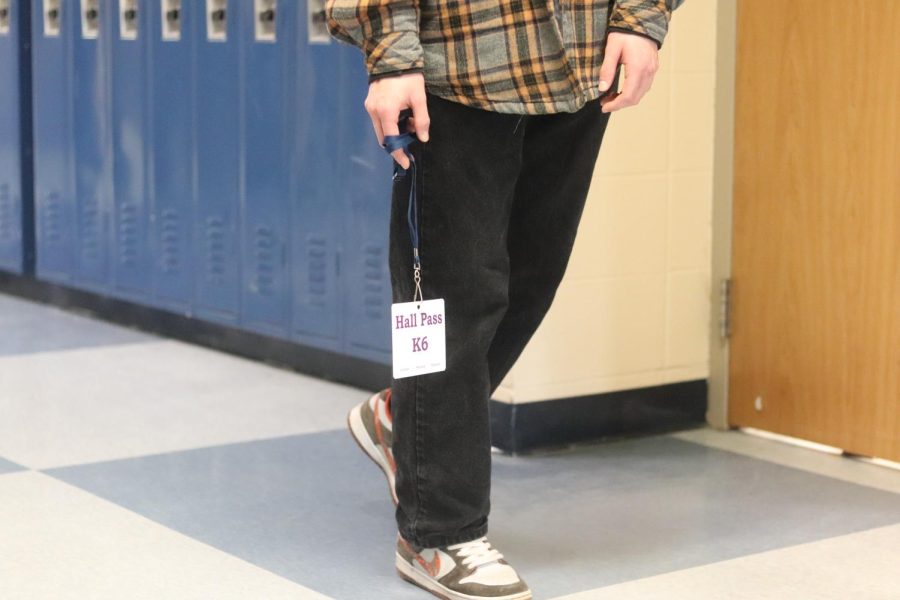How abusing the hall pass affects your peers
February 20, 2023
Imagine you’re in class and the teacher is giving an intense lecture and you’ve never felt more focused. All of a sudden your stomach starts yelling at you to go to the bathroom but as you look to the door for the pass you notice it’s gone. You wait patiently, telling yourself it’s only a bit of discomfort and that you can manage, but, as time passes your curiosity of who has the pass turns into steaming resentment towards whoever took it. This is one example of the many ways you affect your classmates by taking the pass without a reason. At the start of the second trimester, the appropriate passing times for the bathrooms were changed in hopes of balancing out the former rule which allowed students to take the pass in between the first fifteen and last thirty minutes of class. With the old rule, some students experienced conflict when they needed to use the bathroom towards the end of class.
The new rule allows students to excuse themselves to the restroom between the first and last twenty minutes of class.
The need for the 20/20 rule comes from the abundance of kids that loiter in the halls after the bell rings for class. By keeping students in class for the first and last twenty minutes, security can easily point out truancy.
“[When the bell rings] for first, second, fourth and fifth hour, it’s easy to tell who’s supposed to be in class, but third hour’s a little tricky since it’s lunch time,” said Assistant Principal Alex Hill.
Sometimes other students can restrict their peers from accessing the restroom. Groups of students that loiter in the bathroom to vape or even just talk with their friends before class cause an unnecessary amount of congestion and sometimes even get the bathrooms locked completely, cutting off the students that actually need to go.
“When the bathroom in your wing is closed, you have to walk to another one which can take a while,” said senior Jeannecia Muanda. “You run the risk of getting in trouble with your teacher since there’s usually a bunch of students from that wing holding you up.”
Even though the 20/20 rule is intended to be enforced across the whole school, the rule is teacher-dependent. Some teachers’ protocol may differ from others. Some of our educators teach classes that are at the college level, and the students in these classes can be much more mindful and considerate about how they use the pass and how they might be affecting their peers. “Bladders can’t tell time,” said English teacher Anne Lewis.
Along with the majority of teachers, both biology teacher Jason Wagner and government and economics teacher Ryan Allen follow the rule and allow their students to use the bathroom as long as their request is during the first or last twenty minutes of class..
All that teachers and staff ask is for students to understand the amount of privilege in their hands when they take the pass out of class. Oftentimes students will take the pass and abuse it, instead of using it correctly. They might wander aimlessly throughout the halls, meet up with a friend, they might go to the bathroom to smoke their vape device or do other unauthorized activities. The result is that other students in the class who need to use the restroom cannot because each teacher is given only one pass.
“I can see why someone would say that only having two or three passes per class is ‘silly’, but kids need to understand the reason passes are limited is to keep them from leaving class whenever they get bored,” said Daniel Houvener, who teaches anatomy and forensic science.
Being conscious of why you’re taking the pass is a very considerate thing to do for your classmates. By being mindful and putting yourself in your peers’ shoes, you can imagine how frustrating it must be when you need to use the bathroom but can’t because someone chose to be selfish.
Gavin Pittman who graduated from Norrix in 2021 was falsely accused of not putting the pass back by his fourth hour teacher, Ms. O’shea when one day, He was working in class but was interrupted by O’shea when she noticed the pass laying next to his feet. The pass appeared after Gavin’s tablemate Evan took the pass to the bathroom and while walking back, he thought it would be funny to pull a joke on Gavin –laying the pass next to his feet as he returned to his seat. Ms. O’shea accused gavin of not putting the pass back. Gavin argued that he wasn’t the only person who wasn’t putting the pass back (implying that Evan hadn’t put it back). This didn’t convince Ms. O’shea, in fact, Gavin’s response led Ms. O’shea to believe that Gavin didn’t put the pass back because he’s a selfish only child. Evan’s dishonesty created so much confusion that Ms. O’shea’s perception of Gavin was blurred. This is just one of many examples that shows us how being dishonest with our teachers and even ourselves in certain scenarios can have negative impact on our peers in class.












